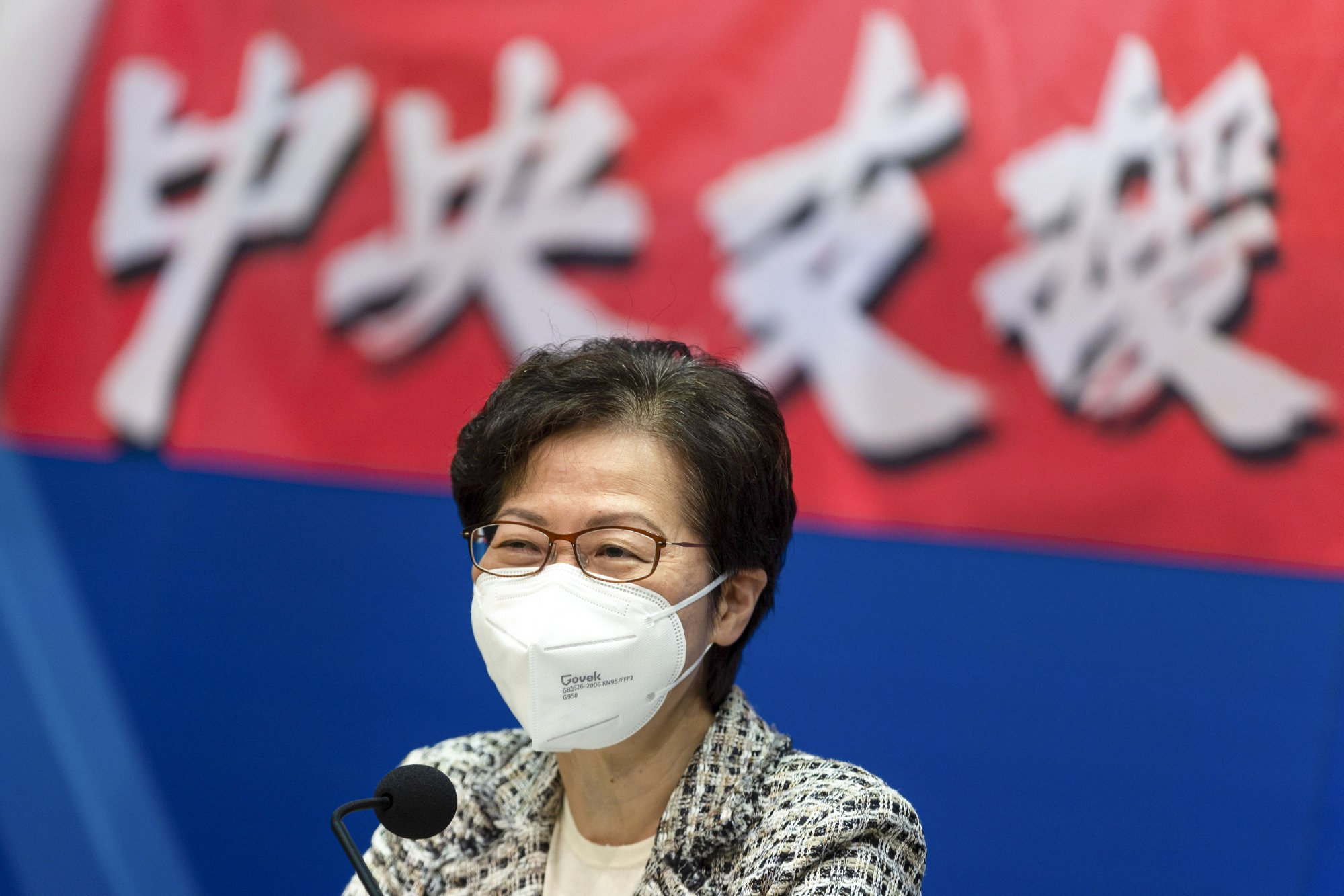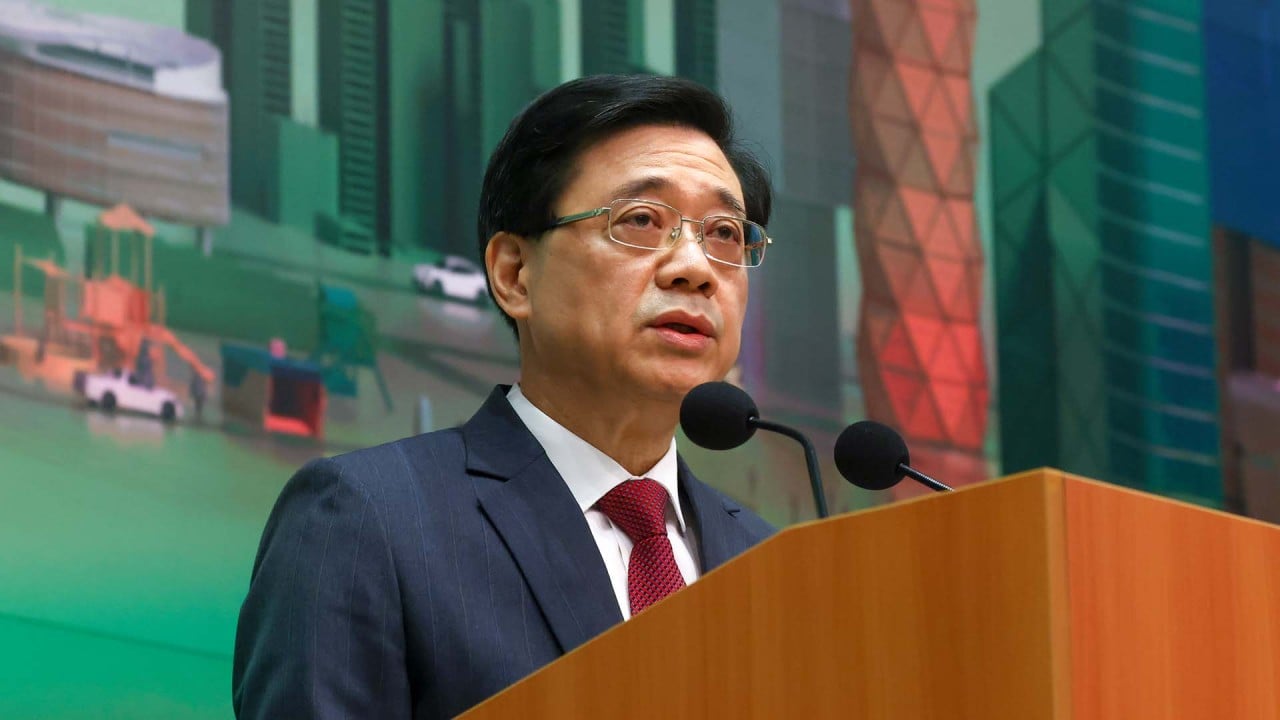
Hong Kong chief executive election 2022: ‘John Lee’s campaign team mull cash donations to guard against US sanctions’
- Former security chief lost a platform to reach out to voters when Google took down his YouTube campaign channel, citing need to comply with US sanctions law
- The Post breaks down how the sanctions law could affect US nationals and Hong Kong residents seeking to donate to his campaign
The campaign team of Hong Kong’s sole chief executive candidate John Lee Ka-chiu is considering raising funds in cash after US sanctions triggered the removal of his election channel from YouTube earlier in the week, the Post has learned.
The move by tech giant Google to terminate Lee’s channel had also left political and business heavyweights worried about possible legal consequences if they contributed to the campaign of a sanctioned former Hong Kong official, one source familiar with the matter said on Friday, adding some donors could end up funding his election effort anonymously.
Following the surprise takedown of one of Lee’s main platforms to connect with voters, his team was re-evaluating the risk of continuing to handle donations through an intricate network of banks, which left the cash susceptible to greater scrutiny by the US authorities, the insider said.

Sources close to Lee’s campaign office said the team had considered the possible effects of US sanctions since the beginning of the election, with donors advised to show their support through cash payments instead of online or bank transfers.
The team had become more cautious after it emerged on Wednesday that Lee’s YouTube had been taken down, the source said, noting there had been discussions on how to properly handle and register the cash, while also protecting the personal information of donors.
“Some of those big names might donate anonymously, or even skip donations, as the YouTube incident proved that US intervention could happen,” the insider said. “Of course, supporters who are closely linked to the mainland could still offer donations publicly.”
According to the city’s election rules, a donation can only be made anonymously if the amount is HK$1,000 (US$127) or below. For anything above that, a receipt with the name and address of the donor must be provided and submitted to the Registration and Electoral Office.
The Electoral Affairs Commission said on Friday that the limit for campaign expenses would be set at HK$17.6 million this year.
Tam Yiu-chung, Lee’s campaign office chief, stopped short of revealing any further details about the team’s fundraising activities, noting “some people have created difficulties for us, but Lee has already said there is nothing to worry about”.
At present, the former minister’s team has not created any fundraising links on their campaign channels to attract donations, in contrast to hopefuls who took part in previous chief executive elections.
During the 2017 election, incumbent leader Carrie Lam Cheng Yuet-ngor received HK$18.7 million in donations from business heads, with top supporters also mobilising family members and staff to bankroll her campaign. Donors included family members of Henderson Land, senior employees at Cheung Kong Property Holdings and bosses of Hopewell Holdings.
Lawyers who spoke to the Post said the sanctions slapped on the then-security minister could prove to be an impediment now that he was raising funds for his leadership bid as the sole Hong Kong candidate endorsed by Beijing.
For a start, they said, a predicament could arise when donors contributing to Lee’s campaign were American citizens, or wired money, especially US dollars, through a United States bank.
Even if the contributor was not a US citizen or was transferring money through a bank that had no presence in America, the person could still be targeted by the US government, one lawyer argued.
“The US government could potentially go after the person, or they could go after the financial institutions that are supporting the campaign contributions,” said the specialist in sanctions law, who spoke on condition of anonymity citing the sensitivity of the issue in the city.
Another legal scholar, Professor Surya Deva, who specialises in business and public law at the Macquarie Law School in Sydney, suggested that the likelihood of the US government going the extra mile to target non-US individuals and entities would be slim, given the less immediate linkage.
Deva said he doubted there would be “any consequences for now” for Lee’s campaign team members or donors, though he warned: “The US government may later add more people to the sanction list if it felt so, based on their record in undermining Hong Kong’s autonomy.”
On Wednesday, YouTube, which is owned by American tech giant Alphabet, the parent company of Google, terminated the channel Lee had been using to broadcast his meetings with different sectors since announcing his leadership bid on April 9.
“Google complies with applicable US sanctions laws and enforces related policies under its terms of service. After review and consistent with these policies, we terminated the Johnlee2022 YouTube channel,” a Google spokesman told the Post.
It is known that several of the city’s most influential residents hold US passports.
Explaining how the American penalties work, lawyer Ben Kostrzewa, a US sanctions specialist from legal firm Hogan Lovells, said it came in two tiers: primary and secondary.
He said primary sanctions applied when there was a “US element” involved, such as a US citizen, a transaction completed in American currency and deals going through a US financial institution or server.
A breach could attract a fine of US$330,947, according to the latest inflation adjustment.
“Secondary sanction is more complicated,” he explained, referring to scenarios where there were no US factors involved.
Kostrzewa said the US government might still decide to penalise a non-US person or entity when there was a “significant transaction” or “material support” involved by making them a sanctioned individual.
“The risk is whether or not the US government would determine that transaction to be either significant or material support,” he said.
Deva, from the Macquarie Law School, said that it was precisely because donors were not yet part of the sanction list, it was unlikely they could cause problems for Lee’s fundraising efforts.
“However, this would mean some complications in lodging expenses reports as part of election return,” he said, referring to how their declarations could be evidence for the US to act upon.
Hong Kong veteran lawyer Ronny Tong Ka-wah, who is also an adviser to the government’s advisory Executive Council, stressed the sanctions were limited strictly to US citizens and organisations, although he was uncertain about the consequences others might face if they went to the United States.
Entertainment tycoon Allan Zeman said the “hard truth” was that Lam had also been hit with the penalties, and yet it had never affected the government’s ability to raise funds. “There is no reason John should be any different from Carrie Lam,” he said.
In late 2020, Lam revealed she was being paid her entire salary as chief executive in cash because she was on the sanctions list. It is believed Lee was also paid in cash during his tenure as the city’s No 2 official.
One scenario could be donors giving their funds in cash to the candidate. But Zeman, a member of Lee’s presidium, or advisory team, added the chances of Lee tapping a US citizen for funds would be highly unlikely given that many other alternatives were available.
“There is a world outside of the United States,” he said.




